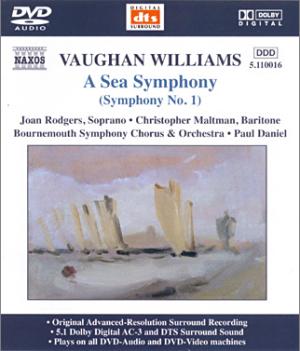DVD Audio Review
A Sea Symphony (Symphony No.1)
Vaughan Williams
The Bournemouth Symphony Chorus & Orchestra
Conducted by Paul Daniel
Joan Rogers, soprano
Christopher Maltman, baritone
DVD Audio disc with DTS and Dolby Digital 5.1 sound
Available on Naxos 5.110016
Running time: 63.52
Crotchet Amazon UK Amazon US

See also:
The Film Music of Vaughan Williams
Vaughan Williams: Sinfonia Antarctica DVD (based on the score for Scott of the Antarctic)
Master and Commander: The Far Side of the World
30 years before he turned his attention to the cinema (with his score for The 49th Parallel (1941)) the great British composer Vaughan Williams addressed the matter of his first symphony. VW was still in the process of finding his mature voice, and clearly influenced by the British folk music he had been collecting for some years, sought a way to free British symphonic music from the Germanic tradition; a progression then reaching its apotheosis in the late symphonies of Mahler, who would die the following year of 1911.
It seems little has changed in the intervening years, as in turning away from Europe, VW sought alliance with America, fining inspiration in the poetry of Walt Whitman. The result was A Sea Symphony the work's programmatic name indicative of a descriptive spirit running through the composer's output which would stand him in good stead in the cinema. The symphony, in four movements for orchestra, plus also chorus, soprano and baritone, does not escape the influence of Mahler's use of vocal forces in his symphonies, and owns at least as much to the large scale cantata and requiem as to the symphony pure. In its grand canvas and flamboyant spirit the music looks back to the 19th century, while for the true future of VW's music one must turn to his much smaller and more introspective Fantasia on a Theme by Thomas Tallis written the same year.
Nailing its nautical colours to the mast, A Sea Symphony is at least as inwardly concerned with the journey of the soul into uncharted waters. There is a cosmological vision to Whitman's words which puts the work in similar territory to Scriabin's Prometheus of 1909, Langgaard's Music of The Spheres (1916-18) or Holst's The Planets (1917). Still, the sound of the music is much more conservative than these works, more patriotically celebratory; almost a last hurrah for Victorian and Edwardian England before the Great War ushered in our modern age. In A Sea Symphony VW looked at once back to a musical past rapidly departing, and forward to the stars, while in his Fantasia he drew inspiration from the older music of Thomas Tallis, yet anticipated the quieter, more questioning, folk inspired classical music of the English 20th century. And it is interesting, perhaps ironic, that it is the Fantasia on a Theme by Thomas Tallis which director Peter Weir chose to employ for two key emotional sequences in the best sailing ship film for many a year, Master and Commander: The Far Side of the World (2003); released on DVD just last week. Weir could have used A Sea Symphony, yet somehow found the Fantasia more evocative of the sea and of the age of great sailing ships.
I have to say that I have never been convinced by A Sea Symphony. Compared to the composer's later symphonies it seems bloated and vastly over-long. The final movement, at 26 minutes, is almost as long as some of his later symphonies in their entirety. There is too much of Sullivan and Parry, too much imperial bombast and insufficient lyricism. VW did not become a truly great symphonist until his Symphony No.3, by which time, significantly, he had dropped the need to title his symphonies.
Paul Daniel keeps a firm hand on the wheel, guiding the BSO through some interminably torturous passages and musical shallows, and Joan Rodgers acquits herself with flying colours. Likewise Christopher Maltman offers a distinguished performance. They make the best of what the score has to offer. Yet A Sea Symphony depends for its impact on a dynamism which reflects the ocean, and orchestral colour filled with sea spray, billowing clouds and flashes of silver light on the water. It is here that the recording lets things down very badly, sounding dull, flat and lacking in life in whichever sound option is selected. It is not simply that the sound barely sounds more than stereo who wants a gimmicky presentation with the orchestra, choir and soloists spread all around the room? but that the sound field lacks little in the way of dimension. There is barely anything even in the way of ambience to suggest a need for more than two speakers, while even the sound which does emanate from the central pair lacks any vitality.
So, a good if not great performance of a formative symphony, presented with very disappointing sound. As such it is difficult to give any sort of recommendation to this release. Which saddens me somewhat as the very fine BSO are my local team and I'm writing this review just along the road from where the performance was recorded.
Gary Dalkin
2
Return to Index